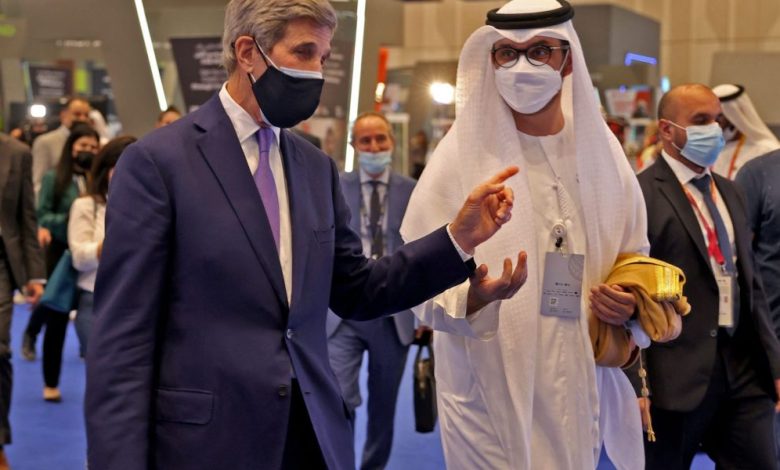UAE Climate Officer: “Joint climate action can help us achieve peace and prosperity. Here’s why we’re working with the US to invest $100 billion in clean energy – and what to expect at COP28.

The message from COP27 in Sharm El Sheikh is clear: the world needs to accelerate the clean energy transition. It’s the shortest route to Net Zero. To get there, we must step up the pace in building global collaborations that bring both economic and climate progress through pragmatic, realistic, practical, and economically viable initiatives.
One of the largest and most ambitious such collaborations announced ahead of COP27 is the new UAE-US Clean Energy Acceleration Partnership (PACE). Its goal is to mobilize $100 billion in financing and investment by 2035 to provide 100 new gigawatts (GW) of clean energy in the US, UAE and emerging markets.
The PACE initiative addresses the reality that failing to meet the basic energy needs of billions of people will significantly slow down the economy, impacting resources allocated to mitigate climate change. By focusing on pragmatic advances to drive the energy transition, we can create new industries, new skills and new jobs.
That’s why the initiative is increasing investment in mitigation technologies across the current energy supply chain to ensure the lowest carbon and methane intensity for the hydrocarbons the world still depends on. In parallel, it directs significant public and private sector funds into emerging clean technologies and their supply chains in the United Arab Emirates, the US and a number of emerging markets around the world. This is critical to balancing the imbalance between mature economies and the Global South when it comes to large-scale commercial deployment of clean energy solutions.
PACE is also focused on the nuclear sector, particularly on innovations in small modular reactors that can be deployed faster than capital-intensive grid-scale reactors. In addition, PACE will devote significant resources to industrial decarbonization by expanding proven technologies such as carbon capture and storage, while investing in new energies such as hydrogen and other fuels that can help power the hardest-to-reduce heavy industries .
The PACE initiative is a good start, but we cannot underestimate the magnitude of the challenge ahead. The world needs an estimated $50-$60 trillion over the next 30 years to decarbonize industrial and energy systems by 2050. No single nation or economic bloc can achieve this magnitude alone – and new models of government and private financing will be required.
As one of the world’s largest investors and operators of renewable energy projects, the UAE has been accelerating clean energy solutions through international public-private partnerships for over two decades. We have invested over $50 billion in 70 countries, from developed economies to small island nations, from utility-scale mega-projects to bespoke, site-specific solutions. Regardless of size and location, these projects are all designed to reduce carbon emissions and be economically self-sustaining.
At the same time, we are expanding our position as a reliable and responsible supplier of the world’s lowest carbon emissions oil and gas by applying proven and new technologies. We were the first hydrocarbon producers in the region to adopt industrial-scale carbon capture and storage—and the first to use nuclear and solar power to meet 100% of our national oil company’s electricity needs. Our motto is “maximum energy, minimum emissions”.
We believe that partnerships on climate change are an opportunity to address the broader issues of peace and economic development.
At COP27, we signed an agreement to implement Project Prosperity between the United Arab Emirates, Jordan and Israel. This begins the execution phase of an initiative to provide Israel with solar energy in exchange for desalinated water for Jordan. The UAE’s Masdar is the technical partner, and the United States provided valuable diplomatic support in an agreement that enhances regional stability, energy security, low-carbon growth and peaceful coexistence at a time when the world needs them all .
We have announced a new partnership between the United Arab Emirates and Egypt to deliver one of the world’s largest onshore wind farms. It will displace an estimated 9% of Egypt’s total carbon emissions and save the country $5 billion in annual natural gas costs.
As the UAE aspires to host COP28, the Emirates Climate Conference in 2023, we will continue to build effective partnerships between countries, between industries and between the public and private sectors to reduce carbon and drive economic progress.
We commit to hosting an inclusive and solution-focused summit that accelerates climate finance, improves access to clean technologies in vulnerable communities, and harnesses the talent of all sectors of society, including women and youth. In doing so, we will work with the world to find an actionable path to Net Zero by 2050.
Sultan Al Jaber, Ph.D., is UAE Minister of Industry and Advanced Technology, Special Envoy for Climate, Chairman of Masdar and Group CEO of Abu Dhabi National Oil Company (ADNOC).
The opinions expressed in Fortune.com comments are solely the views of their authors and do not necessarily reflect the opinions and beliefs of wealth.
More must-read comments posted by wealth:
Sign up for the Fortune Features Email list so you don’t miss our biggest features, exclusive interviews and investigations.



